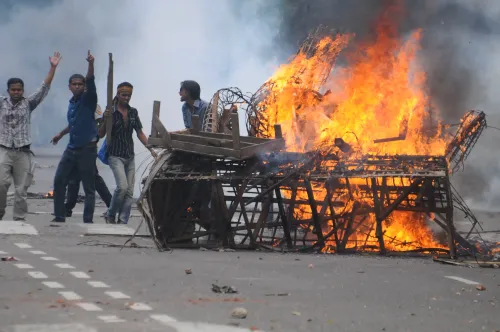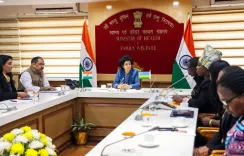Is Pakistan the Central Source of Instability in South Asia?

Synopsis
Key Takeaways
- Evolution of terrorist tactics: Pakistan-backed groups are changing recruitment strategies.
- Threat of white-collar terrorism: Educated professionals are being mobilized for terrorist activities.
- Shift in funding mechanisms: Terrorist organizations are moving to digital payment systems.
- US-Pakistan relations: A reassessment is necessary for regional stability.
- Importance of counterterror reforms: Conditional engagement is crucial for effective US policy.
Washington, Nov 26 (NationPress) The terrorist incident that occurred on November 10 near Delhi's Red Fort, executed by a suicide bomber linked to the Pakistan-based terrorist organization Jaish-e-Mohammad (JeM), highlights the evolving tactics of Pakistan-supported groups in recruitment and fundraising. This shift comes in the wake of India’s successful Operation Sindoor in May, which dismantled multiple operational bases of these groups.
Prior to the Delhi incident, Indian authorities disrupted a terror network operating across three regions, including Jammu and Kashmir. They confiscated nearly 2,900 kilograms of explosives near Delhi, which included 360 kilograms of ammonium nitrate, alongside assault rifles, leading to the arrest of at least 10 doctors tied to the conspiracy.
“The magnitude of the seizure indicates that the ‘white collar’ terrorist cell had intentions for multiple coordinated attacks with potential casualties far surpassing those of the Delhi bombing. It is speculated that the suicide bomber, Dr. Umar Nabi, acted autonomously after authorities thwarted a larger scheme and apprehended his collaborators. Nabi and another doctor from Kashmir reportedly communicated with JeM recruiters via Telegram and met their handlers in Turkey. It is highly plausible that their overseas meeting facilitated access to explosives, funding, and logistical aid,” stated Siddhant Kishore, a national security and foreign policy analyst based in Washington, in ‘The Cipher Brief’.
“This exposure of the white-collar terrorist network signifies a transformation in the recruitment strategies of Pakistan-based terrorist factions—from radicalizing uneducated youth to enlisting educated professionals with specialized skills. Concurrently, JeM and similar organizations are transitioning their funding methods from traditional banking systems to fintech solutions, mobile wallets, and decentralized digital payment frameworks. Together, these developments represent a strategic recalibration toward more sophisticated, less detectable forms of proxy warfare aimed at undermining India’s internal security and social fabric,” he elaborated.
The report emphasized that, in light of these developments, the United States should reevaluate its strengthening connections with Pakistan’s military establishment, a significant contributor to instability in South Asia. It cautions that Washington’s increasing diplomatic and economic engagement with Pakistan could undermine long-term regional stability if it ignores Islamabad’s dual strategy of presenting itself as a counter-terror ally while maintaining terrorist proxies.
“Washington must rethink its Pakistan strategy. The United States should utilize its political influence and aid frameworks to condition engagement on tangible counterterror reforms: dismantling militant networks, enforcing oversight in digital finance, and ceasing cross-border militant operations. Without such conditions, the United States risks legitimizing a regime that perpetuates the very instability it claims to oppose,” the report concluded.










